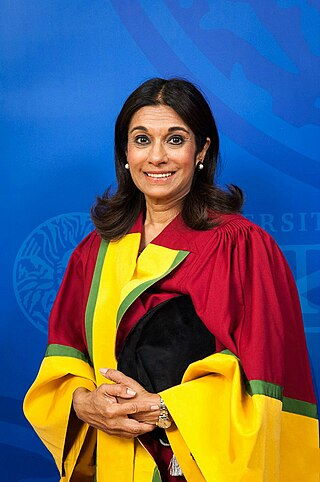Related Research Articles
Islamic Relief Worldwide is a faith-inspired humanitarian and development agency which is working to support and empower the world's most vulnerable people.

The Aga Khan Development Network (AKDN) is a network of private, non-denominational development agencies founded by the Aga Khan, with the primary focus of improving the quality of life in different regions of Asia and Africa.

The Turkish Red Crescent is the Turkish affiliate of the International Red Crescent and the first worldwide adopter of the crescent symbol for humanitarian aid.

Princess Sarvath El Hassan is a Jordanian royal and the wife of Prince Hassan bin Talal of Jordan. She was born in Calcutta on 24 July 1947, to a prominent Muslim family, the Suhrawardy family of the Indian subcontinent.
The Aga Khan Trust for Culture (AKTC) is an agency of the Aga Khan Development Network (AKDN), a family of institutions created by Aga Khan IV with distinct but complementary mandates to improve the welfare and prospects of people in the developing world, particularly in Asia and Africa. It focuses on the revitalization of communities in the Muslim world—physical, social, cultural, and economic. The AKTC was founded in 1988 and is registered in Geneva, Switzerland, as a private non-denominational philanthropic foundation.

International Development and Relief Foundation (IDRF) is a Canadian non-profit organization dedicated to linking Canadian and Muslim communities with overseas development projects, both humanitarian emergency assistance and long term development projects in Asia, Africa, the Middle East, Eastern Europe, and the Americas, based on Islamic principles of human dignity, self-reliance, and social justice.
Masood ul-Mulk TI is a Pakistani expert on humanitarian aid and a development practitioner. He is the CEO of SRSP the largest NGO working to alleviate poverty in North-West Pakistan.
The Sarhad Rural Support Programme (SRSP) is a non-governmental organization dedicated to alleviating poverty in North West Pakistan. Established in 1989, its mission is to reduce poverty and promote sustainable livelihoods in Khyber Pakhtunkhwa, Pakistan.
Al-Khair Foundation (AKF) is an international Muslim aid NGO based in the United Kingdom and Turkey, and is the third largest Muslim charity in the UK. It was established in 2003, and aims to deliver aid to the poor and vulnerable, as well as education for the Muslim community. It specialises in humanitarian support, international development, emergency aid and disaster relief in some of the world's most deprived areas.

The Mongolian Ornithological Society), was founded in 1999 in the capital city, Ulaanbaatar. It is non-profit environmental organisation dedicated to the research and conservation of birds and their habitats, and also other wildlife in Mongolia. It publishes a peer-reviewed annual scientific journal, Ornis Mongolica, and other bird-related books, guidebooks and papers on bird research works and conservation activities in Mongolia and other countries. The Society raises funds for conservation and educational activities by arranging bird watching and wildlife tours to different parts of Mongolia. The society puts great emphasis on educating young researchers and raising public awareness on conservation. Its board members consist of well-known ornithologists, biologists and ecologists from Mongolia and other countries. In collaboration with the Ornithological Laboratory at the National University of Mongolia, a total of more than 30 scientific theses by bachelors, masters, and Ph.D. students have been supervised by members of the society.